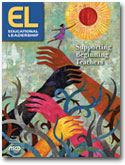How will you respond next fall when asked, "What did you do last summer?" Sure, summer is a time for many educators to catch our breath, to have a few weeks away from the desk, and perhaps to occasionally come in late or leave early. Note that I said "away from the desk" rather than "away from the job." Thanks to technology, our jobs never leave us, and we never leave our jobs. But the summer schedule does offer opportunities that aren't feasible during the school year. That begins with catching up on much-needed relaxation, but it shouldn't end there. Summer is a time not only to relax but also to renew.
Relaxing helps us recoup our energies, enjoy the lighter side of life, and reacquaint ourselves with our loved ones. ("Remember me? I live here, too.") But as necessary as relaxing is, we need more than that. We also need to renew. We need to return to school with new ideas. We need to venture out of our comfort zones and experience the growth that we want to elicit within our schools.
Next fall, the question shouldn't be "What did you do last summer?" but "How did you get out of your comfort zone last summer?" As I wrote in my March column ("Got Grit?"), success comes from learning how to respond to failure. We learn more from our failures than our successes. We need to teach our children how to handle frustration and how to pursue doing things that don't come easily. And we need to practice what we preach by getting out of our own comfort zones to encounter some of the frustration that is integral to growth.
Of course, summer is a time to learn skills that directly relate to our roles. There are conferences to attend and books to read. But important as these activities are, they won't necessarily take us out of our comfort zones. We need to venture away from the comfortable and consciously test the waters of the unfamiliar. Pushing ourselves to be pushed can yield wonderful insights. So what might you do?
Offering possibilities is difficult because comfort zones vary; what is uncomfortable for you may be a piece of cake for me. To get a sense of possibilities, I asked about 30 friends, many of them principals, what they've done to get out of their comfort zones, or what they might do this summer.
Many people described activities that required them to use their bodily-kinesthetic intelligence. David said, "I started training two months before summer began and then completed the [1.4 mile] swim from Alcatraz to San Francisco." He shared this with his student body to inspire them to push themselves. Nick ran a 100-mile ultra-marathon in Vermont, and Audrey did a 100-mile bike ride. Liz wrote, "This summer I'm going on a llama trek with members of my family in Wyoming, where we'll be in charge of the care of the llamas as they carry our goods." Cheryl said she would be "exercising more regularly and in ways that I have not traditionally done."
Quite a few people cited traveling to immerse themselves in a different culture. Jeff described the difficulties of traveling to a country where he doesn't speak the language. Claudia said, "An attitude of openness is needed in order to feel the rhythms of a place and immerse in the sights, sounds, smells, and tastes. My camera helps me look at a scene more fully, with more patience."
Deb suggested entering unfamiliar settings with the conscious intent to suspend judgment. She said, "Visit several different faith communities to experience different perspectives and customs. Visit settings where you are not in the majority or a member of the dominant group." This setting might be a non-English-speaking community or an organization dominated by people of a different race, culture, or sexual orientation, she pointed out.
Principals are often on stage and leading groups, and some chose to extend that experience into riskier territory. Brian said, "I have decided to write a movie script, purely for the experience and because it is way out of my comfort zone." Wade became part of a dinner theater group for a few years and said it was "great fun, but very nerve-wracking." Carly plans to take an adult improvisation class this summer.
Several people talked about seeking different kinds of experiences. Bill will be volunteering as an aide at an Alzheimer's center. Deb plans to take a class in an unfamiliar art—shape note singing, hip-hop dance, or pottery. Carla is trying to decide among juggling, calligraphy, piano, or chess lessons; George said that he had taken up a foreign language "with gusto."
Stepping out of their comfort zones by slowing down was suggested by a couple of people. Kara asked, "Can this mean reading fiction, cutting out of work before the end of the day, and trying new recipes?" And Melissa said, "I think the most important thing is to be as 'unreachable' as possible for two straight weeks. Truly unplug." That would sure be out of my comfort zone!
What about you? What can you do to step out of your comfort zone a bit? Do any of these suggestions appeal to you, or do you have other ideas? Let's look forward to a summer of relaxing and renewing—and stepping out of our comfort zones.
